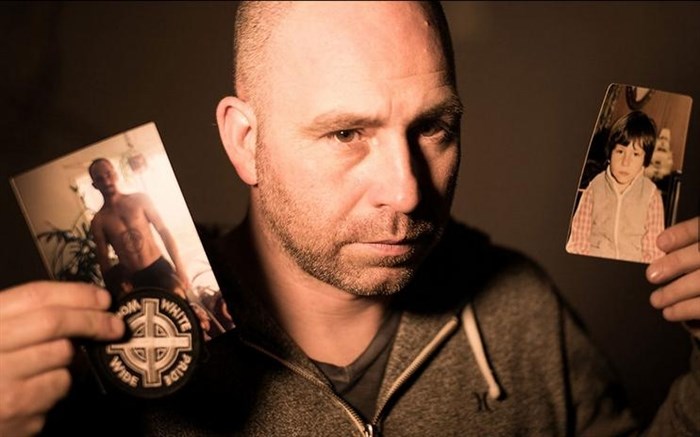
Former white supremacist Daniel Gallant tells his story through Extreme Dialogue, an online project to counter extremist propaganda.
Image Credit: extremedialogue.org
March 05, 2015 - 7:30 PM
KAMLOOPS – A former proponent and recruiter for the white supremacist movement in Western Canada is now working against terrorist organizations by telling his story through short documentary films to counter extremist propaganda online.
Through the Extreme Dialogue project, launched last month, Thompson Rivers University law school student Daniel Gallant, 39, recalls the abuse and violence he endured as a child and how living on Vancouver’s Downtown East Side made him susceptible to gang-life. Gallant says propaganda and having a sense of purpose is what converted him to join the movement in the 1990s.
The Islamic State of Iraq and the Levant, the extremist group commonly known as ISIS, is the latest organization to recruit youth from abroad. Today it was announced an Edmonton man, is believed to be the latest of 160 Canadians recruited by the organization. Months ago, former TRU student Collin Gordon was inspired to join the extremist group after succumbing to online propaganda and is now presumed dead.
Gallant says his online recruitment wasn’t much different from ISIS propaganda. As a former recruiter, he explains the process which led him down the path to extremism. It started with a Ku Klux Klan website.
“I started using that site to connect with other people who were interested in the movement,” he says. “Before that I used it to access resources for literature because I kept having it confiscated at the border.”
Gallant says he began to interact through chatrooms and discussion boards – creating dialogues with people involved in the movement and others on the periphery.
Beyond pamphlets, there was a music element that enticed him. Soon, he was reading books or encyclopedias that reflected white supremacist ideology and anti-Semitic beliefs. He notes several of the ideas within the organization were not far off from jihadist ideology.
“I was very keen on learning this doctrine because it was the antithesis of society essentially. It opposed society which I already had because of my life experiences,” he says. “This gave me a logic system and a reasoning process to find who to blame. But also, it gave me the solution – the final solution.”
Armed with a doctrine and a computer, Gallant set forth to recruit others into the movement, which he says wasn’t too difficult.
“You can essentially convince anybody. What they do is they present correlated facts that are common knowledge and then they establish a cause and effect relationship between those facts in order to create a fairly solidified narrative,” he says.
Gallant didn’t take his extreme right-wing recruitment to those living on the streets like he did. He took it to university campuses, the oil fields in Alberta or the bar.
“After sitting and drinking for several hours, you can talk around what they already know as true and build it into a bigger narrative. Then they’re totally convinced,” he says.
He added the vigilantism and street justice of the skinheads enticed him to release his rage on specific groups of people. Because he already had a hairline temper, he says acting out was a way to blame others for his problems. He committed countless assaults on strangers or others targeted for their race. At times, he would band together with a group and take on bigger assaults.
But it was one specific event, coupled with self-reflection when “everything stopped.”
“I had my last profoundly violent act where I beat an aboriginal man with a hatchet. My intention was to cut off his head. I knocked him out, beat him with the hatchet with the blunt end. I had him unconscious, stretched out his neck. I was sitting there and I just started crying. Everything stopped,” he says.
It’s been 15 years since Gallant left the movement.
With a lot of counselling and education, he’s been able to unpack the ideology he’s convinced himself of throughout the years. He rounded out his knowledge with a bachelor’s degree majoring in First Nations studies, and a master’s degree in social work.
He believes the story he tells through Extreme Dialogue will help affected youth engage in discussion and learn the impact of extremist behaviour. He says the project even made its way up to US President Obama, who encouraged it as a counter-terrorism initiative.
Gallant counsels youth regularly about the dangers of recruitment. He founded Exit Canada, a group to help others disengage from violent extremism.
Because of his knowledge on propaganda and recruitment techniques, Gallant has helped national security teams and counter-terror groups gain a better sense of how it works and when to intervene.
He still regularly accesses chatrooms, but now for a different purpose. He takes down names and hands them off to the police.
Watch Gallant's story along with a separate story from a mother with a son who joined ISIS at www.extremedialogue.org
To contact a reporter for this story, email gbrothen@infonews.ca, or call 250-319-7494. To contact the editor, email mjones@infonews.ca or call 250-718-2724.
News from © iNFOnews, 2015